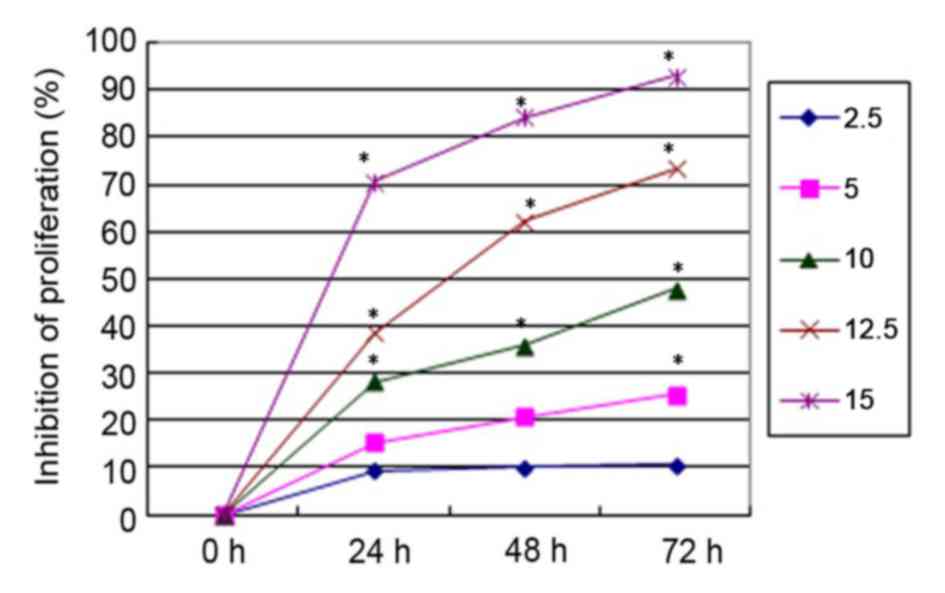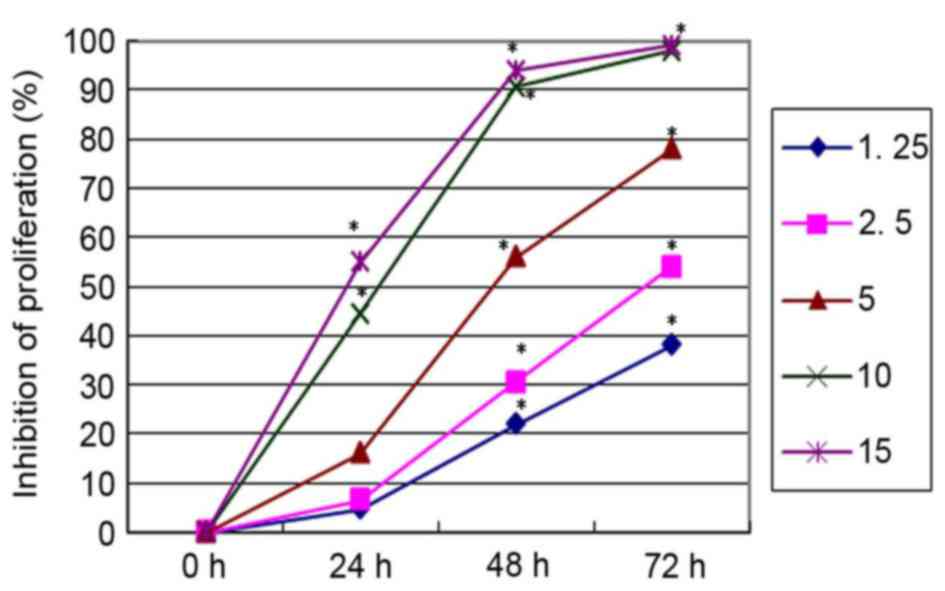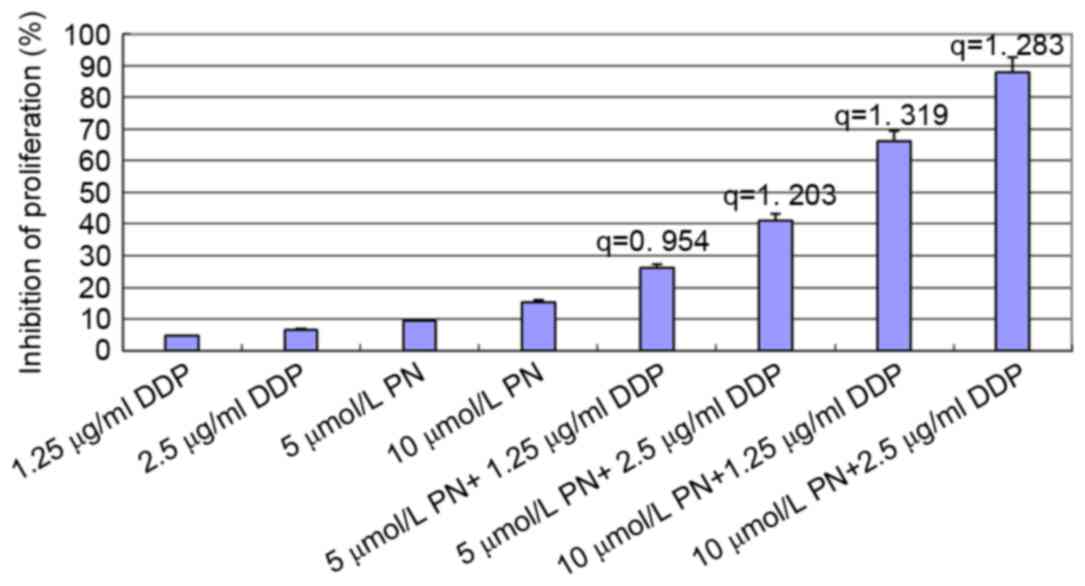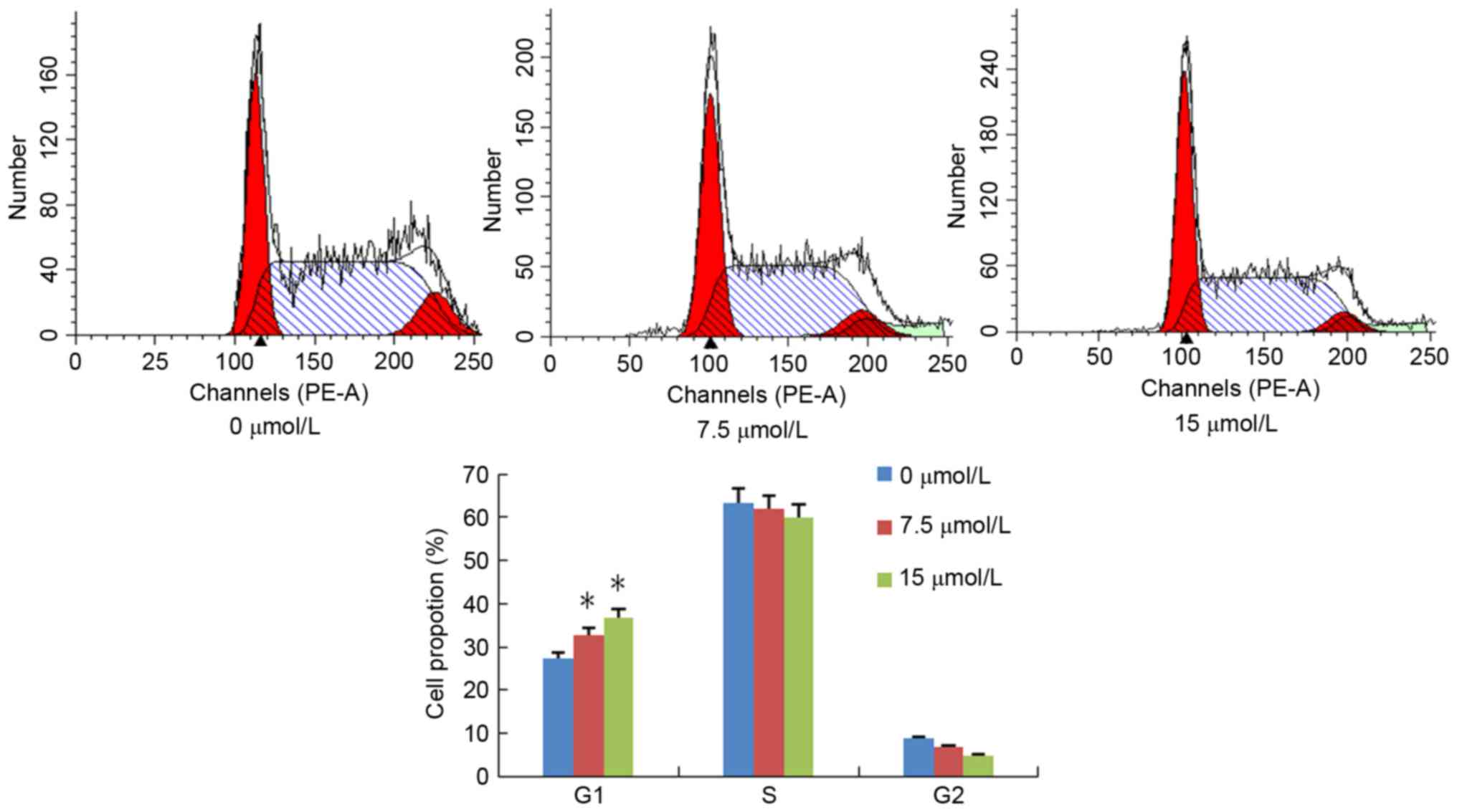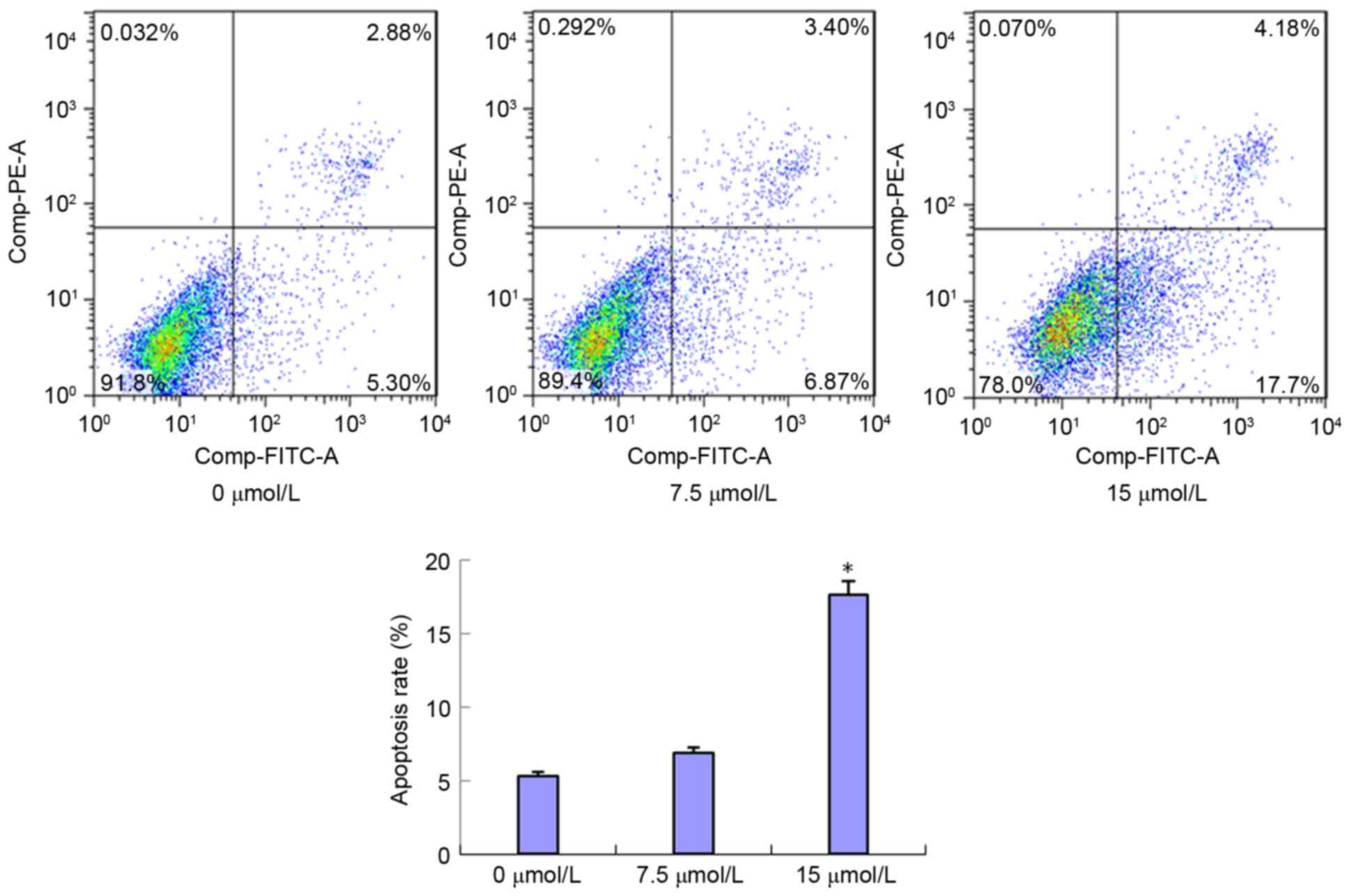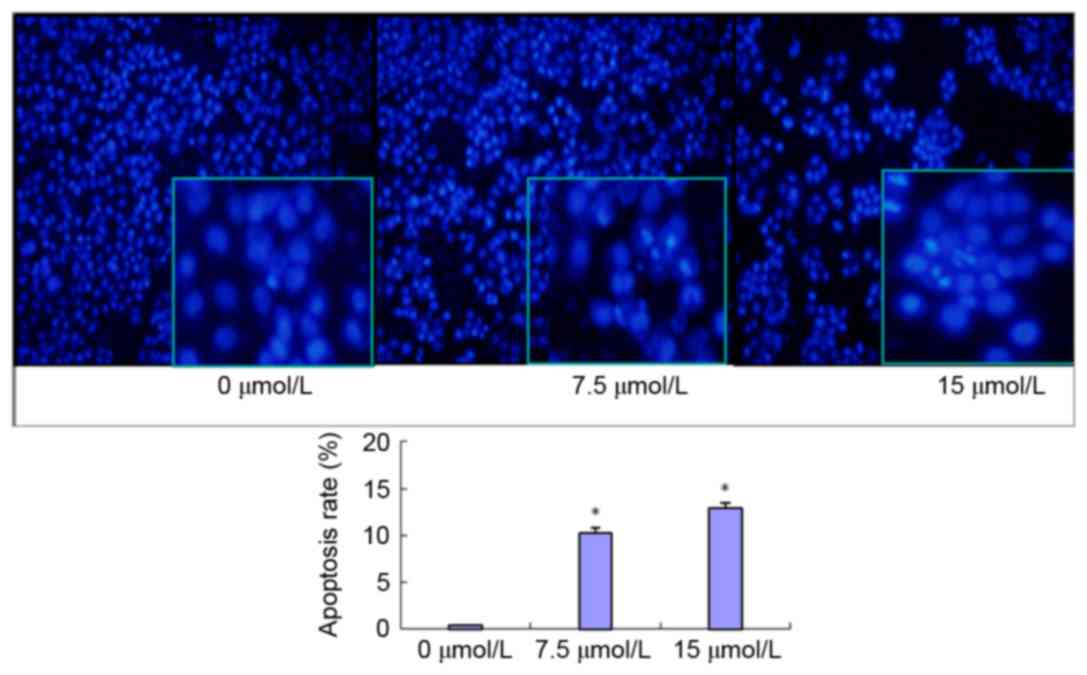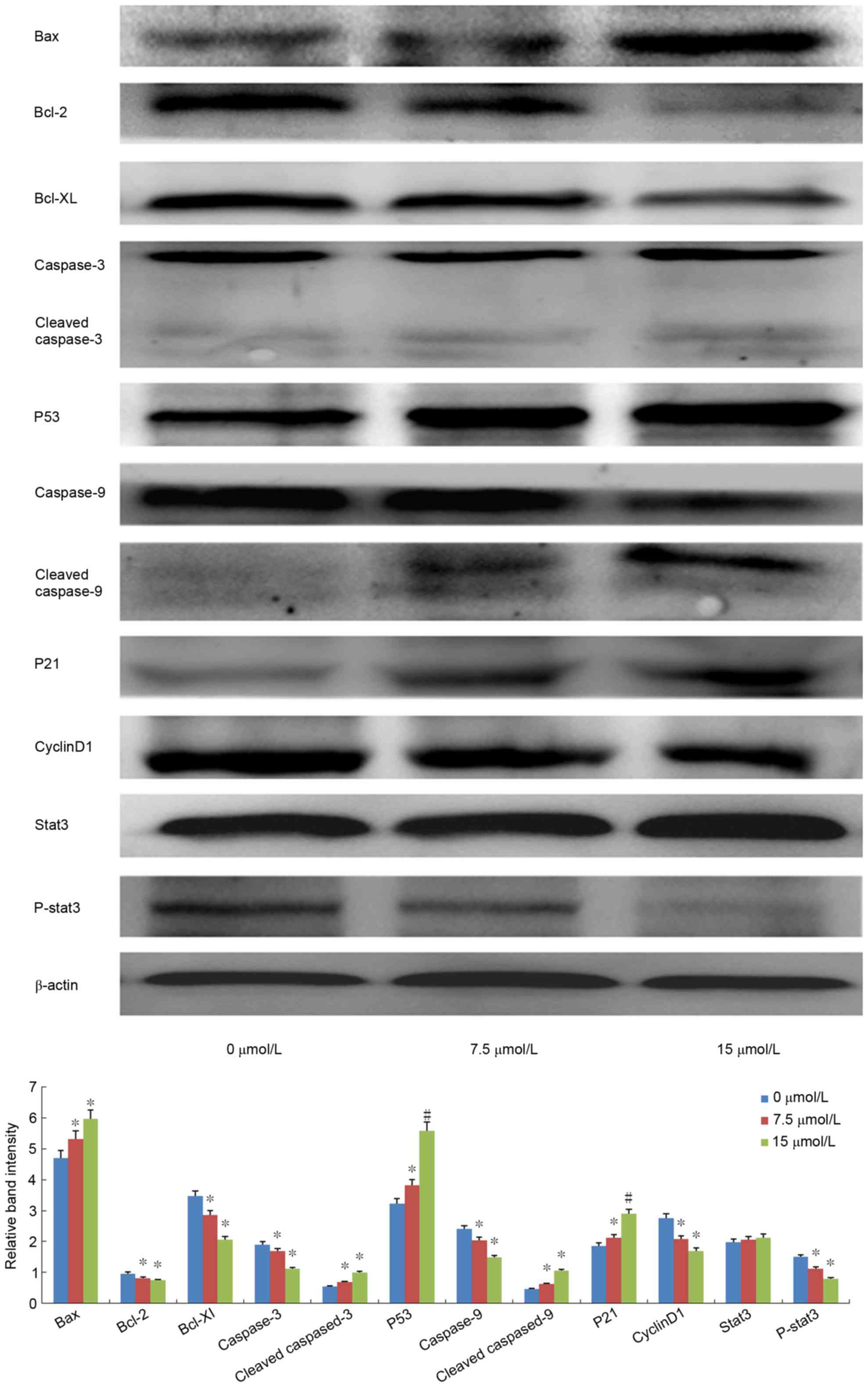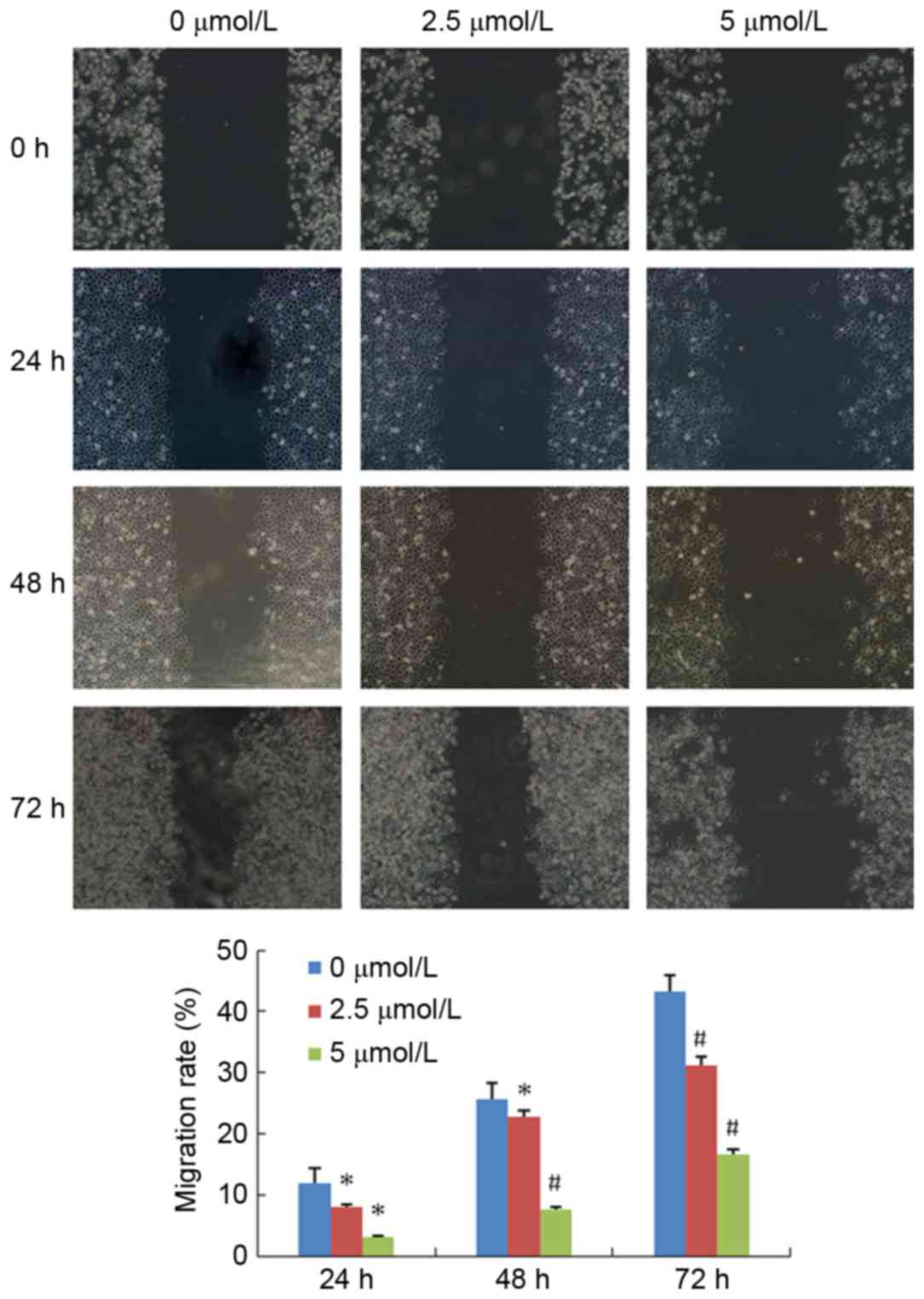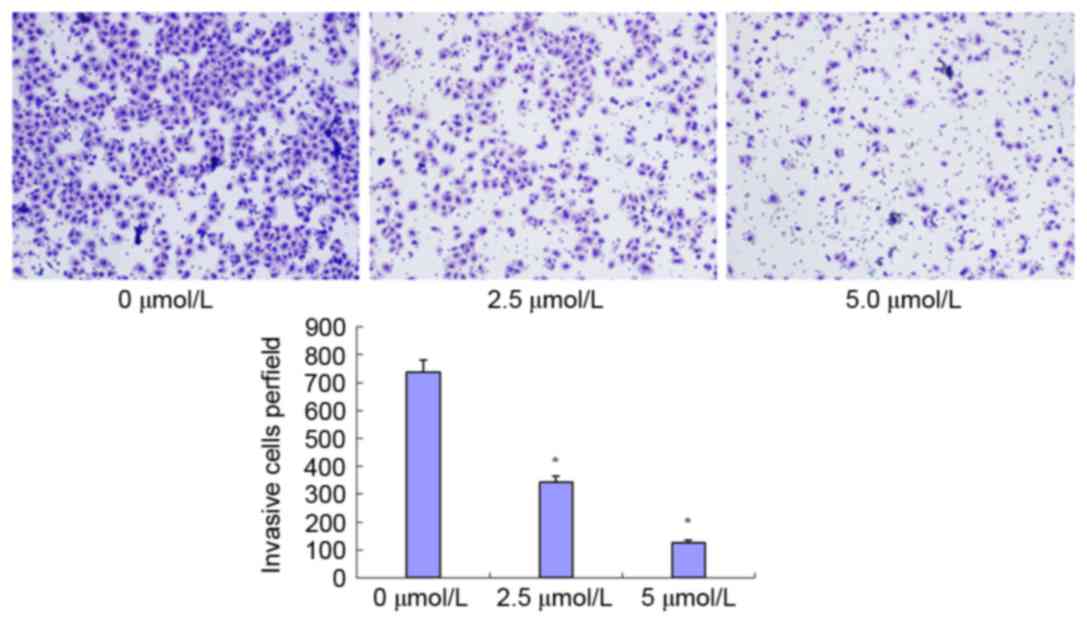|
1
|
Fodale V, Pierobon M, Liotta L and
Petricoin E: Mechanism of cell adaptation: When and how do cancer
cells develop chemoresistance? Cancer J. 17:89–95. 2011. View Article : Google Scholar : PubMed/NCBI
|
|
2
|
Shi H, Lu D, Shu Y, Shi W, Lu S and Wang
K: Expression of multidrug resistance-related proteins
p-glycoprotein, glutathione-s-transferases, topoisomerase-II and
lung resistance protein in primary gastric cardiac adenocarcinoma.
Hepatogastroenterology. 55:1530–1536. 2008.PubMed/NCBI
|
|
3
|
Kishida Y, Yoshikawa H and Myoui A:
Parthenolide, a natural inhibitor of nuclear factor-kappaB,
inhibits lung colonization of murine osteosarcoma cells. Clin
Cancer Res. 13:59–67. 2007. View Article : Google Scholar : PubMed/NCBI
|
|
4
|
Kawasaki BT, Hurt EM, Kalathur M, Duhagon
MA, Milner JA, Kim YS and Farrar WL: Effects of the sesquiterpene
lactone parthenolide on prostate tumor-initiating cells: An
integrated molecular profiling approach. Prostate. 69:827–837.
2009. View Article : Google Scholar : PubMed/NCBI
|
|
5
|
Liu JW, Cai MX, Xin Y, Wu QS, Ma J, Yang
P, Xie HY and Huang DS: Parthenolide induces proliferation
inhibition and apoptosis of pancreatic cancer cells in vitro. J Exp
Clin Cancer Res. 29:1082010. View Article : Google Scholar : PubMed/NCBI
|
|
6
|
Wang W, Adachi M, Kawamura R, Sakamoto H,
Hayashi T, Ishida T, Imai K and Shinomura Y: Parthenolide-induced
apoptosis in multiple myeloma cells involves reactive oxygen
species generation and cell sensitivity depends on catalase
activity. Apoptosis. 11:2225–2235. 2006. View Article : Google Scholar : PubMed/NCBI
|
|
7
|
Dai Y, Guzman ML, Chen S, Wang L, Yeung
SK, Pei XY, Dent P, Jordan CT and Grant S: The NF (Nuclear
factor)-κB inhibitor parthenolide interacts with histone
deacetylase inhibitors to induce MKK7/JNK1-dependent apoptosis in
human acute myeloid leukaemia cells. Br J Haematol. 151:70–83.
2010. View Article : Google Scholar : PubMed/NCBI
|
|
8
|
Shanmugam R, Kusumanchi P, Cheng L, Crooks
P, Neelakantan S, Matthews W, Nakshatri H and Sweeney CJ: A
water-soluble parthenolide analogue suppresses in vivo prostate
cancer growth by targeting NFkappaB and generating reactive oxygen
species. Prostate. 70:1074–1086. 2010. View Article : Google Scholar : PubMed/NCBI
|
|
9
|
Holcomb BK, Yip-Schneider MT, Waters JA,
Beane JD, Crooks PA and Schmidt CM: Dimethylamino parthenolide
enhances the inhibitory effects of gemcitabine in human pancreatic
cancer cells. J Gastrointest Surg. 16:1333–1340. 2012. View Article : Google Scholar : PubMed/NCBI
|
|
10
|
Yip-Schneider MT, Nakshatri H, Sweeney CJ,
Marshall MS, Wiebke EA and Schmidt CM: Parthenolide and sulindac
cooperate to mediate growth suppression and inhibit the nuclear
factor-kappa B pathway in pancreatic carcinoma cells. Mol Cancer
Ther. 4:587–594. 2005. View Article : Google Scholar : PubMed/NCBI
|
|
11
|
Zhang SQ, Zhang SH, Xue XH, Wang XJ and
Jiang JT: Synergism between a siRNA targeted to survivin and 5-FU
in inhibiting MCF-7 cell proliferation in vitro. Nan Fang Yi Ke Da
Xue Xue Bao. 26:251–254. 2006.PubMed/NCBI
|
|
12
|
Gunn EJ, Williams JT, Huynh DT, Iannotti
MJ, Han C, Barrios FJ, Kendall S, Glackin CA, Colby DA and Kirshner
J: The natural products parthenolide and andrographolide exhibit
anti-cancer stem cell activity in multiple myeloma. Leuk Lymphoma.
52:1085–1097. 2011. View Article : Google Scholar : PubMed/NCBI
|
|
13
|
Gao ZW, Zhang DL and Guo CB: Paclitaxel
efficacy is increased by parthenolide via nuclear factor-kappaB
pathways in in vitro and in vivo human non-small cell lung cancer
models. Curr Cancer Drug Targets. 10:705–715. 2010. View Article : Google Scholar : PubMed/NCBI
|
|
14
|
Liu D, Liu Y, Liu M, Ran L and Li Y:
Reversing resistance of multidrug-resistant hepatic carcinoma cells
with parthenolide. Future Oncol. 9:595–604. 2013. View Article : Google Scholar : PubMed/NCBI
|
|
15
|
Sohma I, Fujiwara Y, Sugita Y, Yoshioka A,
Shirakawa M, Moon JH, Takiguchi S, Miyata H, Yamasaki M, Mori M and
Doki Y: Parthenolide, an NF-κB inhibitor, suppresses tumor growth
and enhances response to chemotherapy in gastric cancer. Cancer
Genomics Proteomics. 8:39–47. 2011.PubMed/NCBI
|
|
16
|
Al-Fatlawi AA, Al-Fatlawi AA, Irshad M,
Rahisuddin and Ahmad A: Effect of parthenolide on growth and
apoptosis regulatory genes of human cancer cell lines. Pharm Biol.
53:104–109. 2015. View Article : Google Scholar : PubMed/NCBI
|
|
17
|
Caldera V, Mellai M, Annovazzi L, Valente
G, Tessitore L and Schiffer D: Stat3 expression and its correlation
with proliferation and apoptosis/autophagy in gliomas. J Oncol.
2008:2192412008. View Article : Google Scholar : PubMed/NCBI
|
|
18
|
Kunigal S, Lakka SS, Sodadasu PK, Estes N
and Rao JS: Stat3-siRNA induces Fas-mediated apoptosis in vitro and
in vivo in breast cancer. Int J Oncol. 34:1209–1220.
2009.PubMed/NCBI
|
|
19
|
Barré B, Vigneron A, Perkins N, Roninson
IB, Gamelin E and Coqueret O: The STAT3 oncogene as a predictive
marker of drug resistance. Trends Mol Med. 13:4–11. 2007.
View Article : Google Scholar : PubMed/NCBI
|
|
20
|
Huang S, Chen M, Shen Y, Shen W, Guo H,
Gao Q and Zou X: Inhibition of activated Stat3 reverses drug
resistance to chemotherapeutic agents in gastric cancer cells.
Cancer Lett. 315:198–205. 2012. View Article : Google Scholar : PubMed/NCBI
|
|
21
|
Kohsaka S, Wang L, Yachi K, Mahabir R,
Narita T, Itoh T, Tanino M, Kimura T, Nishihara H and Tanaka S:
STAT3 inhibition overcomes temozolomide resistance in glioblastoma
by downregulating MGMT expression. Mol Cancer Ther. 11:1289–1299.
2012. View Article : Google Scholar : PubMed/NCBI
|
|
22
|
Yue P, Zhang X, Paladino D, Sengupta B,
Ahmad S, Holloway RW, Ingersoll SB and Turkson J: Hyperactive EGF
receptor, Jaks and Stat3 signaling promote enhanced colony-forming
ability, motility and migration of cisplatin-resistant ovarian
cancer cells. Oncogene. 31:2309–2322. 2012. View Article : Google Scholar : PubMed/NCBI
|
|
23
|
Duan Z, Ames RY, Ryan M, Hornicek FJ,
Mankin H and Seiden MV: CDDO-Me, a synthetic triterpenoid, inhibits
expression of IL-6 and Stat3 phosphorylation in multi-drug
resistant ovarian cancer cells. Cancer Chemother Pharmacol.
63:681–689. 2009. View Article : Google Scholar : PubMed/NCBI
|
|
24
|
Lei XY, Zhong M, Feng LF, Yan CY, Zhu BY,
Tang SS and Liao DF: Silencing of Bcl-XL expression in human
MGC-803 gastric cancer cells by siRNA. Acta Biochim Biophys Sin
(Shanghai). 37:555–560. 2005. View Article : Google Scholar : PubMed/NCBI
|
|
25
|
Min H and Wei-hong Z: Constitutive
activation of signal transducer and activator of transcription 3 in
epithelial ovarian carcinoma. J Obstet Gynaecol Res. 35:918–925.
2009. View Article : Google Scholar : PubMed/NCBI
|
|
26
|
Peyser ND, Freilino M, Wang L, Zeng Y, Li
H, Johnson DE and Grandis JR: Frequent promoter hypermethylation of
PTPRT increases STAT3 activation and sensitivity to STAT3
inhibition in head and neck cancer. Oncogene. 35:1163–1169. 2016.
View Article : Google Scholar : PubMed/NCBI
|
|
27
|
Yu LF, Zhu YB, Qiao MM, Zhong J, Tu SP and
Wu YL: Constitutive activation and clinical significance of Stat3
in human gastric cancer tissues and cell lines. Zhonghua Yi Xue Za
Zhi. 84:2064–2069. 2004.(In Chinese). PubMed/NCBI
|
|
28
|
Song JM, Qian X, Upadhyayya P, Hong KH and
Kassie F: Dimethylaminoparthenolide, a water soluble parthenolide,
suppresses lung tumorigenesis through down-regulating the STAT3
signaling pathway. Curr Cancer Drug Targets. 14:59–69. 2014.
View Article : Google Scholar : PubMed/NCBI
|
|
29
|
Carlisi D, D'Anneo A, Angileri L,
Lauricella M, Emanuele S, Santulli A, Vento R and Tesoriere G:
Parthenolide sensitizes hepatocellular carcinoma cells to TRAIL by
inducing the expression of death receptors through inhibition of
STAT3 activation. J Cell Physiol. 226:1632–1641. 2011. View Article : Google Scholar : PubMed/NCBI
|
|
30
|
Czyz M, Lesiak-Mieczkowska K, Koprowska K,
Szulawska-Mroczek A and Wozniak M: Cell context-dependent
activities of parthenolide in primary and metastatic melanoma
cells. Br J Pharmacol. 160:1144–1157. 2010. View Article : Google Scholar : PubMed/NCBI
|
|
31
|
Cheng G and Xie L: Parthenolide induces
apoptosis and cell cycle arrest of human 5637 bladder cancer cells
in vitro. Molecules. 16:6758–6768. 2011. View Article : Google Scholar : PubMed/NCBI
|
|
32
|
Ghantous A, Saikali M, Rau T,
Gali-Muhtasib H, Schneider-Stock R and Darwiche N: Inhibition of
tumor promotion by parthenolide: Epigenetic modulation of p21.
Cancer Prev Res (Phila). 5:1298–1309. 2012. View Article : Google Scholar : PubMed/NCBI
|















